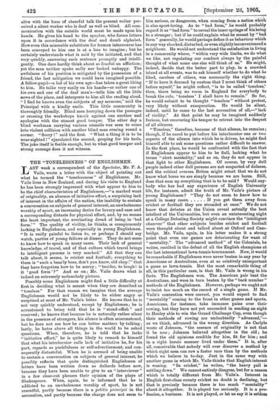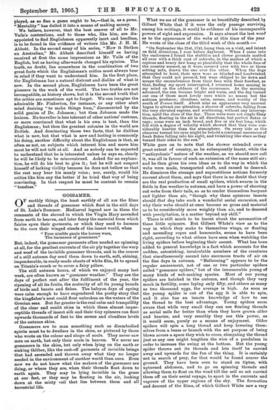T AST week a correspondent of the Spectator, Mr. P. A.
4 Vaile, wrote a letter with the object of pointing out what he termed the " tonelessness " of Englishmen. Mr. Vaile lives in New Zealand, and during his visits to England he has been strongly impressed with what appear to him to be the chief characteristics of Englishmen,—" a marked want of originality, an absence of initiative effort, a surprising lack of interest in the affairs of the nation, the inability to sustain a conversation on subjects of general interest, an unwholesome worship of sport, an increasing desire for luxury and ease and a corresponding distaste for physical effort, and, by no means the least important, the everlasting dread of being in bad form.'" The quality of virility, he thinks, is conspicuously lacking in Englishmen, and especially in young Englishmen. "It is really painful to listen to, or perhaps I should say watch, parties of young fellows at dinner. They do not seem to know how to speak in many cases. Their lack of general knowledge, of travel, and of that culture which travel brings to intelligent persons is very marked." All that they can talk about, it seems, is cricket and football; everything to them is "such a beas'ly bore, don't you know, old chap !" that they have forgotten how to be merry ; " besides, to laugh ! is it good form ' ?" And so on ; Mr. Vaile draws what is indeed an extremely melancholy picture.
Possibly some Englishmen might find a little difficulty at first in deciding what is meant when they are described as "toneless." For that reason we imagine that the average Englishman would not be likely to be either angry or surprised at most of Mr. Vaile's letter. He knows that he is not very quickly understood, except by Englishmen; he is accustomed to being told that be is " stand-offish " and reserved; he knows that because he is naturally rather silent in the presence of strangers, his silence is often misconstrued, but he does not see how he can better matters by talking ; lastly, he hates above all things in the world to be asked questions. When, therefore, he is told that he lacks "initiative effort," be is quite likely to remark to himself that what his interlocutor calls lack of initiative he, for his part, regards as pushfulness or self-advertisement, and con- sequently distasteful. When be is accused of being unable to sustain a conversation on subjects of general interest, he possibly reflects that quite distinguished Englishmen of letters have been written down as dullards before now, because they have been unable to give to an " interviewer " in a few clear-cut phrases their opinion of the plays of Shakespeare. When, again, he is informed that he is addicted to an unwholesome worship of sport, he is not resentful, partly because there is a petitio principii in the accusation, and partly because the charge does not seem to
him serious, or dangerous, when coming from a nation which is also sport-loving. As to " bad form," he would probably regard it as " bad form " to reveal the inner springs of his being to a stranger; but if he could explain what he meant by " bad form " generally, he would perhaps define it as behaviour which in any way shocked, disturbed, or even slightly inconvenienced a neighbour. He would not understand the satisfaction in living in a community where, "within very wide limits, we do what we like, not regulating our conduct always by the painful thought of what some one else will think of us." He might, indeed, decide that the better part to play, in a crowded island at all events, was to ask himself whether to do what he liked, careless of others, was necessarily the right thing. " If to have it decreed by custom that I must think of others before myself," he might reflect, " is to be called toneless,' then, there being no room in England for everybody to break the rule, 'toneless' I shall have to remain." So far, he would submit to be thought " toneless " without protest, very likely without exasperation. He would be silent, indeed, until he came to the last accusation of all,—" lack of virility." At that point he may be imagined suddenly furious, but recovering his temper to retreat into the deepest of all silences.
" Toneless," therefore, because of that silence, he remains ; though, if he cared to put before his interlocutor one or two aspects of the silence into which he is driven, he might find himself able to ask some questions rather difficult to answer. In the first place, he would be confronted with the fact that if Englishmen appear to him to be dull, lacking what ho terms " alert mentality," and so on, they do not appear in that light to other Englishmen. Of course, by very dull people indeed other dull persons are not suspected of dulness, and the critical oversea Briton might retort that we do not know what bores we are simply because we are bores. Still, does that sum up everything that is to be said Would any- body who has had any experience of English University life, for instance, admit the truth of Mr. Vaile's picture of young Englishmen ? " They do not seem to know how to
speak in many cases If you get them away from cricket or football they are stranded at once." We do not know that debates at the Union reveal actually the best intellect of the Universities, but even an uninteresting night at a College Debating Society might convince the "intelligent observer" that other subjects besides cricket and football were thought about and talked about at Oxford and Cam- bridge. Mr. Vaile, again, in his letter makes it a strong point that even our games are deteriorating for want of "mentality." The "advanced method" of the Colonials, he writes, resulted in the defeat of all the English champions at the last international lawn-tennis tournament. Now, it would be remarkable if Englishmen were never beaten in any year by Americans or Australians, even at so relatively unimportant a game as lawn-tennis. But the most remarkable thing of all, in this particular case, is that Mr. Vaile is wrong in his facts. The Englishmen won. The American pair beat the Australians, and were in turn beaten by the " back number " methods of the Englishmen. However, perhaps we ought not to insist too much on the record of a single game. If Mr. Vaile's contention were correct, you would expect to find " mentality" coming to the front in other games and sports. Americans, for instance, take immense pains over their rowing, but they have not yet succeeded in sending an eight to Henley able to win the Grand Challenge Cup, even though their methods of rowing are undoubtedly " advanced,"— as we think, advanced in the wrong direction. As Carlyle wrote of Johnson, "the essence of originality is not that it be new ; Johnson believed altogether in the old ; he found the old opinions credible for him, fit for him ; and in a right heroic manner lived under them." It is, after all, conceivable that nobody will ever discover a method by which eight men can row a faster race than by the methods which we believe in to-day. Just in the same way with another game in which Mr. Vaile thinks that English interest is waning. "In cricket," he writes, "the heavy pall is settling down." We cannot entirely disagree, but for a reason which is totally different from Mr. Vaile's. Interest in English first-class county cricket no doubt is declining, but that is precisely because there is too much " mentality " about it altogether. It is played too seriously. It is a pro- fession, a business. It is not played, or let us say it is seldom played, as so fine a game ought to be,—that is, as a game. "Mentality" has dulled it into a means of making money. We believe, however, that the best answer of all to Mr. Vaile's contentions, and to those who, like him, are dis- appointed to find Englishmen apparently inert and heedless, is to be found in the evidence of writers like Mr. J. H. M. Abbott. In the second essay of his series, "How it Strikes an Australian," Mr. Abbott described himself as having received at first the same impressions as Mr. Valle of the English, but as having afterwards changed his opinion. The truth, no doubt, lies somewhere in the combination of two great facts which the Englishman's critics must always bear in mind if they want to understand him. In the first place, the Englishman has a natural distrust and dislike of what is new. In the second place, Englishmen have been the great pioneers in the work of the world. The two truths are not incompatible, as history shows, but it is the second truth that the critics are sometimes apt to forget. We can imagine the admirable Mr. Pinkerton, for instance, or any other alert mind desiring " to make things hum," disconcerted by the solid genius of Dr. Johnson ; but then Johnson made the lexicon. No traveller is less tolerant of other nations' customs, or more convinced that what is his own is best, than the Englishman ; but then the greatest colonies in the world are British. And dominating those two facts, that he dislikes what is new, but that what is new and lasting is commonly his doing, another difficulty about the Englishman is that, as often as not, on subjects which interest him and move him most he will not talk at all. And as nobody can be expected to understand that he is interested unless he says so, clearly he will be likely to be misconstrued. Asked for an explana- tion, he will do his best to give it ; but he will not suspect himself of lacking virility because he does not bellow so that the rest may hear his manly voice ; nor, surely, would his critics like him any the better if he tried that way of being convincing. In that respect he must be content to remain " toneless."











































 Previous page
Previous page